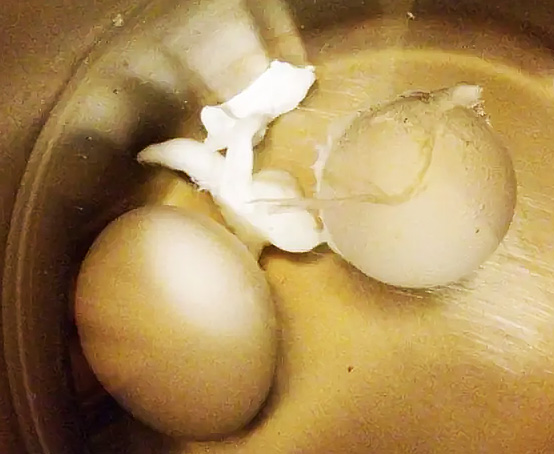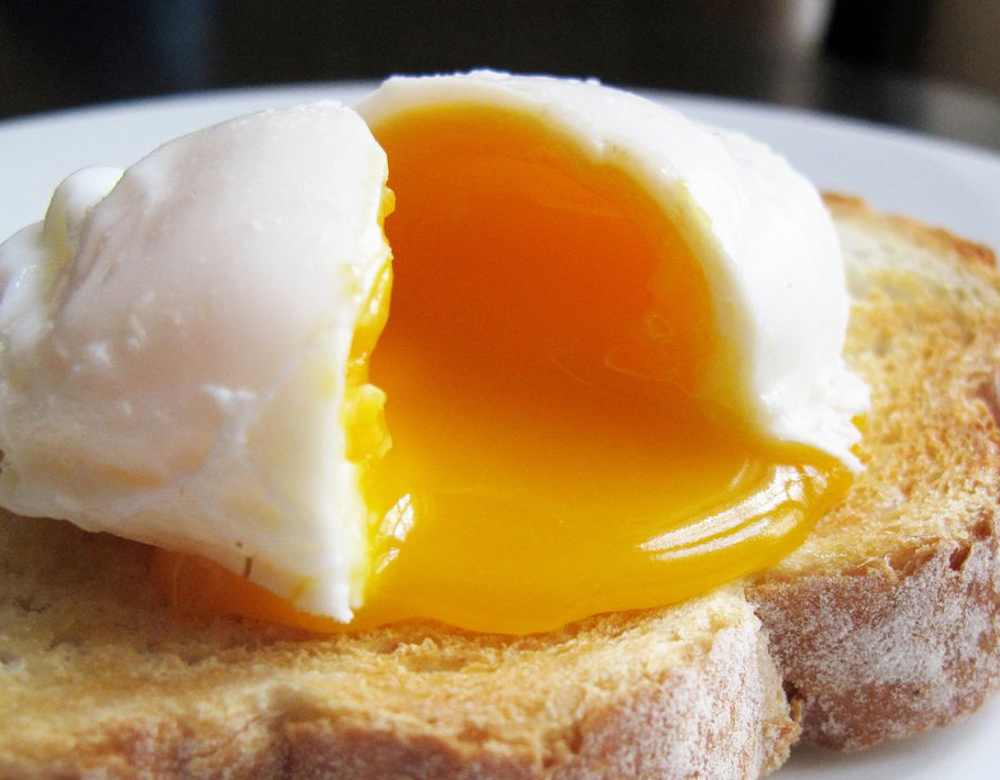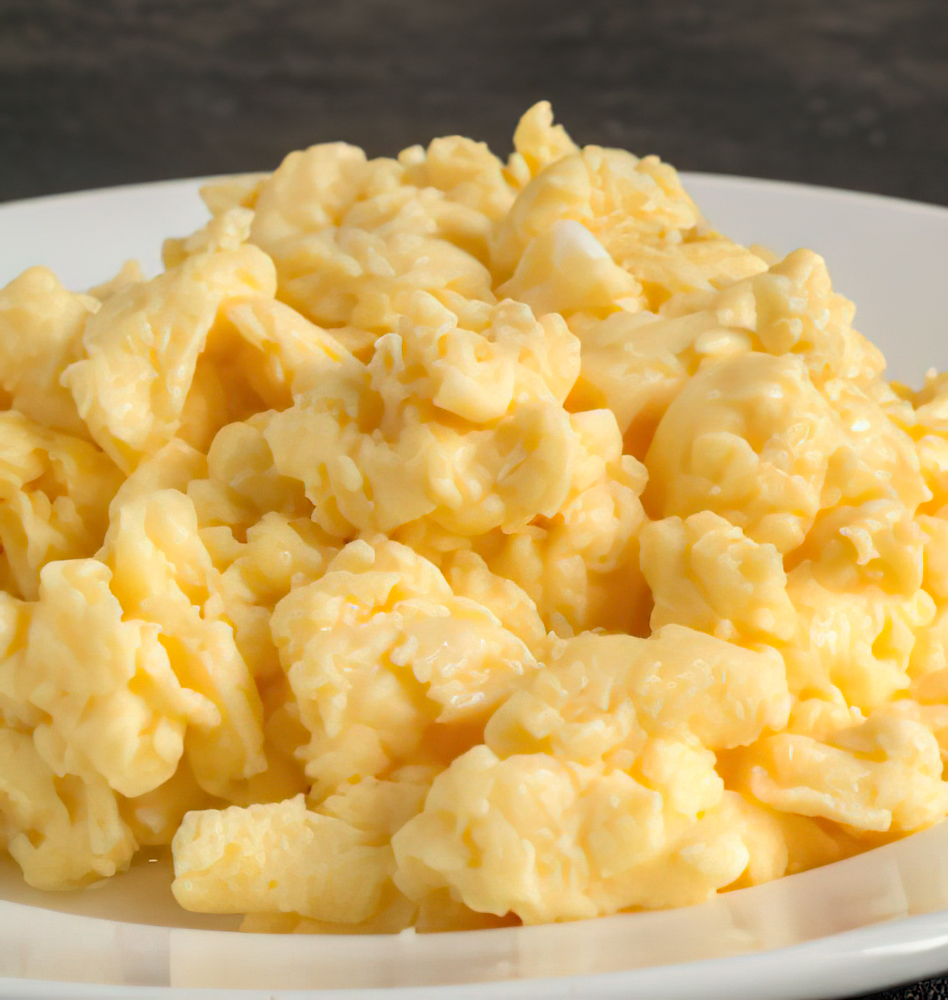Many people hard-cook eggs by putting them into already-boiling water. The temperature shock, it is claimed, causes the shell to expand quickly and crack, resulting in stringy and unsightly egg white leaking out. But while this theory seems to make sense, it is not true.
First of all, an expanding shell is not likely to crack–a shrinking shell is. In this case, an egg could crack when it is done cooking and is transferred from the boiling water to the cold water bath. Of course, by that time, cracks do not matter.
So, why do some eggs crack sometimes when you boil them? Some eggs already have invisible cracks in them from rough handling during production and shipping. These will indeed open up in hot water and release egg white. In some cases, if the water is actively boiling, the eggs will be bounced around and cause new cracks. Thus, if you must boil eggs, use gently simmering water.
I once saw Julia Child demonstrate this on her TV show. She took a bunch of raw eggs from an ice water bath and put them directly into simmering water, and not one of them cracked. Pretty convincing! This has also been my experience, although Like many other cooks, I prefer the steaming method these days. Please refer to this page for details.
Unfortunately, this is not true. Farm eggs and store-bought eggs differ significantly in nutritional content. As you have probably already guessed, the farm eggs win this contest hands-down. Why? It is mainly due to the diet of the hens that produce the eggs.
Hens that are raised on small farms spend much of their time freely roaming pastures and finding their own food. Their diet is varied and includes seeds, insects, worms, and greens. These foods provide a wider variety of nutrients than the processed pellets that are fed to factory chickens (think “chicken chow”). As a result, there are more nutrients in the eggs. For example:
- Omega-3 Fatty Acids: Farm-fresh eggs can have up to 20 times more omega-3 fatty acids than conventionally raised eggs.
- Vitamins: Farm eggs have more vitamins A, D, and E, sometimes a lot more. They also have seven times more beta-carotene, which contributes to the deeper yolk color.
- Cholesterol and Saturated Fat: Farm-fresh eggs often contain less cholesterol and saturated fat than store-bought eggs.
- Protein: Some studies suggest that farm eggs may have slightly more protein per egg compared to store-bought varieties.
It should be noted simply being organic does not guarantee better nutritional value. An organic egg could well have been raised on a factory farm and fed “chicken chow.” So, for better nutrition, buy your eggs from small local farms if at all possible.
Many people hard-cook eggs by putting them in already-boiling water. The temperature shock, it is claimed, causes the shell to expand quickly and crack, with stringy egg white leaking out. But while this seems to make sense, it is not true.
First of all, an expanding shell in not likely to crack–a shrinking shell is. In this case, an egg might crack when it is done cooking and is transferred from the boiling water to the cold. Of course, by this time, cracks do not matter.
iI one saw Julia Child, on her show, demonstrate this. She took a bunch of raw eggs from an ice water bath directly into boiling water, and not one of them cracked. Pretty convincing!
So, why do some eggs crack? It seems to be two things. Some eggs already have invisible cracks in them from rough handling during production and shipping. These will indeed open up in hot water and release egg white. Also, rapidly boiling water will bounce the eggs around and cause new cracks. Thus, if you must boil eggs, use gently simmering water.
But the best way to cook “hard-boiled” eggs is, in my and many other cooks’ opinions, steaming. Please refer to this post.
Eggs set up when their proteins denature, typically when exposed to heat. But acids–such as vinegar–also can cause egg whites to denature. Thus, some people add vinegar to the poaching liquid on the theory that it will give eggs with a nicer shape.
Nice theory, but it doesn’t work. The problem is that acid denatures egg proteins slowly, and by the time the vinegar has an effect the eggs are already set up from the heat. And the vinegar can make the eggs a bit tougher and, of course, add a vinegar taste. So, skip the vinegar!
What about salt? It has no effect on the cooking but can help the flavor.
My usual technique was to beat the eggs with salt (and maybe a touch of milk) and cook them immediately. The other day I got distracted and the salted, beaten eggs sat for about 30 minutes before they went in the pan. They were unusually good! So I did some research and turns out I was not imagining it.
When eggs beaten with salt sit for a while, the salt causes some physical changes. You can see this in their color–after sitting, the salted eggs take on a deeper, richer yellow color. It also leads to particularly moist and tender curds when cooked. Beating in the salt just before cooking gives fine results too, just not quite as fine! And adding salt near the end of cooking gives tougher curds that may be watery. So, salt early when you can!
There’s a kernel of truth in this one. When you beat egg whites until they are stiff, you are actually creating a foam in which the egg white proteins form bubbles with the air you are beating in. Fats tend to collapse foams and an egg yolk contains a lot of fat, hence the origin of this “rule.” It may have had some validity when people made meringues by hand, but with today’s power mixers you’ll be able to make a perfectly good, stiff meringue even if a bit of yolk gets mixed in.
In fact, you can’t judge an egg by its cover, or some such. The color of an egg’s shell has nothing to do with the quality of what’s inside but rather is related to the color of the hen’s feathers and earlobes.






